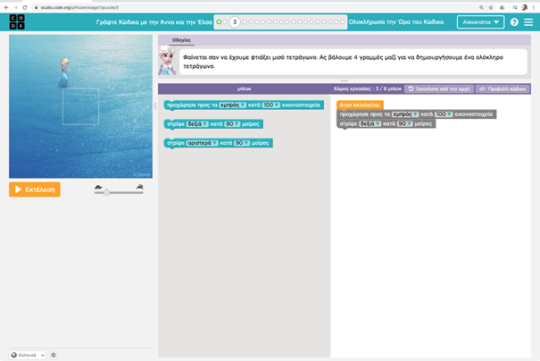Coding from home 8
Publication date: July 3, 2020
Insights into remote teaching and inclusive coding activities
Over 80 people joined the last webinar for this schoolyear on Tuesday, 30 June 2020. Ambassadors and leading teachers from Greece, Romania, Italy and Cyprus shared their tips and best practices on distance learning and coding for inclusion. In case you missed it, the recording is available online on the EU Code Week YouTube channel.
In the beginning of the webinar the new ambassador for Switzerland – Brice Copy was presented. Welcome to the team, Brice!
Next, Naír Carrera, Education Manager at European Schoolnet, presented two new learning bits, coming up in the following month – Coding for sustainable development goals and Artificial Intelligence. To support the development of these learning materials, the Code Week team is calling ambassadors, edu coordinators and leading teachers to apply and record a tutorial video on one of the subjects and share it with the community. If you are interested, you have the chance to apply here by 10 July, 12:00 CET.
The first learning bit has the objective to inspire children to start coding for sustainable development, in accordance with the The United Nations Sustainable Development Goals (SDGs). Topics include health and well-being for people of any age, gender equality and measures against climate change.
The second learning bit promotes AI and will help teachers introduce the topic of AI and machine learning in their class and will encourage students to not fear technology but to explore the opportunities it has to offer.
Then, Naír presented the new Code Week massive open online course – the Deep Dive MOOC and encouraged participants to register for the course, which starts on 16 September and will remain open until the end of October.

Following Naír’s presentation, Alexandros Kofteros, a leading teacher from Cyprus presented the teaching methods that he and his colleagues used during the lockdown. He reported several problems that the school experienced during the lockdown – since schools had to close, all planned events had to be cancelled. However, students were enthusiastic to do more coding activities even under these circumstances. Alexandros took it upon himself to make this possible virtually by bringing teachers or parents together online. The next step was to decide how to integrate coding in language and math classes. The teachers found many resources and video tutorials for students to follow while studying remotely.

They also combined textbook lessons with coding activities on code.org and even went a step further to organise a coding activity on a special version of Scratch, called Snap, which allows students to program and recreate shapes by feeding commands into the tool. Students loved the approach and started collaborating on their own to create even more complex shapes. To manage the activities, Alexandros and his colleagues used a learning management system, like Class Dojo, Moodle or Google Classroom.

You can access the full presentation here.
Ioana Chiorean, a Code Week ambassador in Romania was the next to present how she helped schools in Romania to cope with the COVID-19 situation and its associated lockdown. “Closing rapidly meant that kids went home without necessarily having a plan. Teachers did not have previous training to create remote classes for them instantly. This affected around 2.6 million children in Romania and inequities were maximised.” And that’s where the NGO Cartea Dalieli (Dalia’s Book) came to the rescue.
Ioana had started volunteering with the organisation some years ago so they decided to launch a program to tackle the issue. 110 volunteers from Romania answered the call to help children continue learning during the pandemic. Around 419 students in the age of 9 to 13 started learning coding by creating animations, stories and games in Scratch. The activities even attracted some parents who joined the lessons.

The full presentation is available here.
Following Ioana’s presentation, Spyridon Blatsios from Greece gave an overview of the Erasmus+ project <diversamente=“coding” > which teaches digital skills to people with hearing impairments. The project was launched two years ago, and it mainly focused on people in the age between 18 and 55, since they have more difficulties finding a job. One of the challenges was to establish contact with these people, so they reached out to different NGOs to spread the word. The project took place in the countries Italy, Greece, Spain, Cyprus and Austria and the resources are available in English, Italian, German, Greek and Spanish. One of the main resources used was the visual programming language Scratch, since it proved to be particularly suitable for people with hearing impairments to pick up coding.
The last presentation was given by Stefania Altieri, a leading teacher in Italy who introduced a series of coding quizzes and games she developed together with her students on Google Forms to keep them active and interested during the lockdown. One of the games was called Escape Coding, based on the escape room trend. Roby is a robot, which has lost his way and students should give him instructions to help him escape the strange place. Now we won’t spoil all the fun by telling you about the rest of the activities, but you can find the whole series here and try them out for yourself! If you want to learn even more about the project, read this blogpost by Stefania.

The webinar was concluded with a discussion on whether the webinars should continue in September. The outcome was a definite yes.

Finally, the participants voted on which topics the webinars should cover. The questionnaire gathered many ideas and the favourite ones were artificial intelligence, coding and activities on Scratch.

Thanks to all participants for their active involvement in EU Code Week. We hope to see you again in September!


